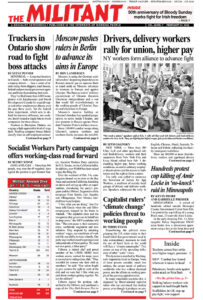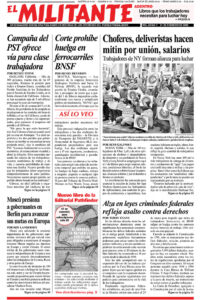Over a dozen masked unsanctioned settlers in the West Bank attacked a group of Palestinian farmers and their supporters from Israel Jan. 21 as they were planting trees by the village of Burin, south of Nablus. The attackers used clubs and threw rocks at the group, and poured gasoline on a nearby car and set it on fire. At least seven people were injured, the most serious hospitalized in Israel. The assailants came from Givat Ronen, an outpost not authorized by the Israeli regime.
Organized by Rabbis for Human Rights and the Olive Harvest Coalition, the Israeli groups drove to Burin to join with Palestinian residents to plant trees in areas that had been damaged or vandalized by thugs. They were there as part of celebrating the Jewish holiday of Tu Bishvat, a tree-planting festival day in honor of loved ones and friends.
Israeli Defense Forces in the area did nothing to stop the assault.
“Burin has been the scene of a number of attacks by settlers and Jewish extremists,” wrote the Jerusalem Post Jan. 21, which “have been caught on video, including incidents in which settlers can be seen throwing stones at homes.”
The Yesha Council, a group representing Israeli settlers on the West Bank, condemned the attack. This “contradicts the values of the people of Israel and harms settlement efforts,” the organization said in a statement.
The editors of the Post condemned the failure of leading Israeli government officials to respond to this attack Jan. 24. “Defense Minister Benny Gantz who is in charge of the IDF and the West Bank? Silence,” they admonished. “Prime Minister Naftali Bennett? Quiet. The same deafening silence was heard from Justice Minister Gideon Saar, Interior Minister Ayelet Shaked and more.”
Attacks by settlers have been on the rise over the past several years, aimed at destroying local Palestinians’ livelihoods or driving them off the land. According to the United Nations, there were 496 attacks last year, with 126 of them resulting in physical harm. This is a 39% increase from 2020.
In spite of growing violence, more Palestinians and Israeli settlers on the West Bank have stepped up contact and established closer social and cultural ties. The fight for recognition of Israel as a Jewish state by Arab states in the region and by Palestinian organizations, and for an independent Palestine state by Israel, would open up more political space for workers on both sides of the borders to collaborate and fight together against attacks coming down on them by all of the capitalist rulers.
On Feb. 4 some 400 Israelis returned to Burin to help Palestinian farmers plant olive trees. “Returning to the scene of the attack, two weeks after it occurred, represents a significant victory,” Avi Dabush, executive director of Rabbis for Human Rights, told the media.

